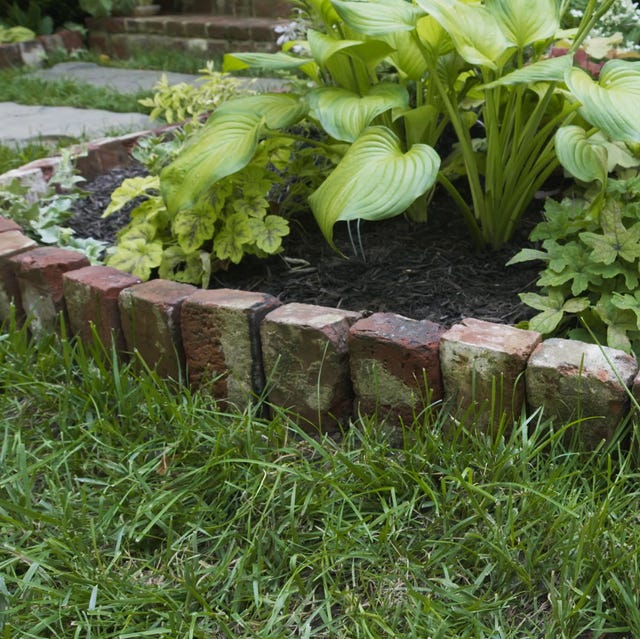How To Make A Concrete Edge For Garden

Brad Holland
Choosing the right garden edging—the material used to define the perimeter of plant beds—can make a huge difference in the look of your home's landscaping. "I always tell our clients to pick materials that are classic, will age beautifully, and go with the style of your house," says Roots Landscape's Nathan Tuno, who helped House Beautiful contributor Eddie Ross with the landscape design at Edgewood Hall. Because sorting through the myriad options can be daunting, we asked Tuno to walk us through six of his favorite materials.
1 Brick
Inexpensive and easy to install, bricks are a go-to choice for garden edging. In fact, Ross used reclaimed brick to create the edging on his front garden beds at Edgewood Hall, digging a trench and placing each brick vertically, adding in a few metal stakes to hold them in place. "I didn't need any mortar, and the project took about a day in total," he says.
BUY NOW Reclaimed bricks, Bricksalvage.com
2 Metal
Often used to edge pathways, metal edging—this one is steel that's been painted black—can also be a great choice for garden beds in more modern homes. Another bonus: The panels can be bent and cut to fit odd angles or curves.
BUY NOW Galvanized steel edging, Gardeners.com
3 Wattle
A slightly pricier material, woven "wattle" edging can be found at higher-end garden centers. "We often use it in smaller gardens," says Tuno, as well as in window boxes: "A single panel is a great way to jazz up the look of your window boxes, plus it adds some color and texture in the winter months."
BUY NOW Woven willow edging panels, The Home Depot
4 Cedar Shingle
Another inexpensive option, cedar shingle edging can be found at most local hardware stores, says Tuno. "What I love about it is that in a year or so, it will have this nice gray color," he says. Another tip: if the gingerbread edge isn't your thing, install the shingles upside down for a nice, straight line.
BUY NOW Cedar edging, Lowe's
5 Cobblestone
Available in an array of colors, large cobblestones make a beautiful garden edging—especially as they age and develop a mossy green coating. You can install them vertically or horizontally in a mortar bed, says Tuno. "Oftentimes we install it vertically and use it for raised garden beds with pathways in between," he explains.
BUY NOW Cobblestone edging blocks, Lowe's
6 Picket Fencing
This timeless edging is a great option for traditional homes. It's a breeze to paint, says Tuno, plus it's easily replaceable, so if one panel gets damaged, you don't have to worry about redoing the whole thing.
BUY NOW Picket fencing, The Home Depot
Emma Bazilian Senior Features Editor Emma Bazilian is a writer and editor covering interior design, market trends and culture.
This content is created and maintained by a third party, and imported onto this page to help users provide their email addresses. You may be able to find more information about this and similar content at piano.io
How To Make A Concrete Edge For Garden
Source: https://www.housebeautiful.com/lifestyle/gardening/g28969530/best-garden-edging/
Posted by: herronoverniseents1972.blogspot.com

0 Response to "How To Make A Concrete Edge For Garden"
Post a Comment